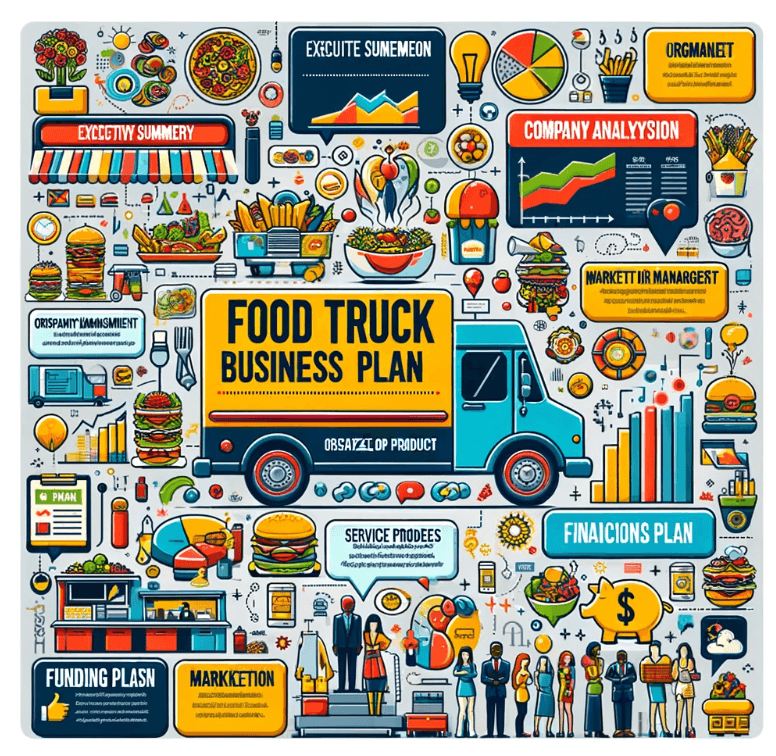A business plan is vital for most new businesses but it is an absolute must imperative for a prospective mobile food vendor. By creating food truck business plans, you accomplish some important things:
- Make a step-by-step plan for getting your food truck up and running.
- Learn about the different aspects of running a food truck, as well as finding out who your local competition is and who in your market will be your potential customers.
- Document important your menu, kitchen layout, ingredient costs, marketing plan and more!
A business plan is especially helpful to those new to the mobile food industry. It creates a blueprint for building your food truck business, and will tip you off to problems you may not have previously considered, such as the hoops you need to jump through for licensing and health codes.
Page Contents
- Questions a business plan should answer:
- The 9 Sections of a Food Truck Business Plan
- 1.) Executive Summary
- 2.) Company Description
- 3.) Market Analysis
- 4.) Business Operations Plan
- 5.) Management & Ownership
- 6.) Service or Product Line
- 7.) Marketing Strategy
- 8.) Financial Section
- 9.) Appendix Section
- Before You Submit the Business Plan
- Plan to Update Your Business Plan
Questions a business plan should answer:
- What problem or problems exist that your business is trying to solve?
- What is the potential consumer’s pain?
- How deep and compelling is this pain?
- What solutions does your business have to resolve the problem(s)?
- How much will it cost to solve these problems now?
- How big can your business growth if given the requested capital?
- What will the customer pay you to solve this problem?
- How will solving this problem make your company a lot of money?
- What alliances or relationships can you leverage with other companies to help yours?
- How much cash do you need to find a path to profitability?
- How will the skills of your business team, their business knowledge, and track record of execution make this happen?
- What will be the investors’ exit strategy?
The 9 Sections of a Food Truck Business Plan
Here are the key sections of a business plan you’ll need to write a in-depth food truck business plan.
1.) Executive Summary
Start out with an overview of the meat and potatoes of your business plan. Think of it as the introduction. Develop it so it keeps your readers attention. Here are two tips for writing an executive summary geared toward a food truck business plan.
Give the reader (potential investors or yourself) the basics of your business concept. What is the style or cuisine of food you’ll be serving from your new food truck, the name of the business and your primary parking locations (parts of the city, events, catering).
Explain why you are well suited to operate a food truck. Do you have previous cooking experience in food trucks or restaurants? If not, do you have any experience in the food truck business? If the answer is no, then you need to be prepared to sell them on the idea that despite your lack of experience, you are still the perfect person for this new food truck business. You could also include a short mission statement in this introductory section of the business plan.
2.) Company Description
This part of food truck business plans is sometimes referred to as a business analysis. It explains in more detail (than the executive summary) to the reader the operation location, legal name and the concept of the food truck you want to create. This is where you will give details on your local competition. This includes food trucks and restaurants, population of the areas you will operate and other information you have gather during your research.
3.) Market Analysis
This part of food truck business plans is where you lay out your marketing strategy. There are three primary parts to a market analysis section:
Industry
Who will be your customers? Is your food truck going to serve business professionals at lunch time? The bar crowd on late nights? Explain your customer base and why they are going to flock to your new food truck, not the competition.
Competition
Who is your competition? Many people opening a new food truck assume everyone will prefer their truck to the existing trucks in the area. Don’t underestimate them. Many of them have already built a loyal customer base. Poaching poach customers from them will not be easy.
Find out as much as you can about your competition, including their menu, parking locations and prices. Then explain in a paragraph or two how you will compete with the already established businesses.

Attending food truck festivals can be a smart strategy for vendors.
4.) Business Operations Plan
This section is where you explain about your when and where you plan to operate. Creating a business operations plan for a hot dog truck involves outlining the daily activities, logistics, and strategies that ensure the business runs smoothly and efficiently. Below is a sample operations plan tailored for a food truck business. In this example, Monday and Tuesday serve as off-days for the food truck.
| Day of the Week | Activity |
|---|---|
| Wednesday | Inventory check and supplier orders. Set up at local business district for lunch rush (11 AM – 2 PM). Clean and restock cart. |
| Thursday | Receive and organize inventory. Serve at university campus (11 AM – 3 PM). Participate in local evening market (5 PM – 9 PM). |
| Friday | Morning prep and maintenance check. Serve at business district (11 AM – 2 PM). Evening service at nightlife area (6 PM – 11 PM). |
| Saturday | Attend local farmer’s market or event (10 AM – 4 PM). Evening service at popular park or event space (5 PM – 10 PM). |
| Sunday | Special event catering or attend food truck rallies if scheduled. Optional service at local park (12 PM – 5 PM). Weekly deep cleaning and prep for next week. |
Vending Locations List
Creating a list of vending locations with detailed contact and address information is essential for a food truck owner for several reasons. First, it helps in planning the truck’s route and schedule efficiently, ensuring that you maximize your presence in high-demand areas and during peak times. Second, having a list facilitates building relationships with location managers or event organizers, which can lead to more regular vending opportunities.
| Location Name | Contact Person | Phone Number | Address | |
|---|---|---|---|---|
| Downtown Business Park | John Doe | (555) 123-4567 | Email Address | 123 Business Ave, City, State, Zip |
| University Campus | Jane Smith | (555) 234-5678 | Email Address | 456 College Rd, City, State, Zip |
| City Night Market | Alex Lee | (555) 345-6789 | Email Address | 789 Market St, City, State, Zip |
| Local Brewery | Sam Rivera | (555) 456-7890 | Email Address | 1010 Brewery Lane, City, State, Zip |
| Festival Grounds | Casey Kim | (555) 567-8901 | Email Address | 1212 Festival Way, City, State, Zip |
This list acts as a reference for planning your daily, weekly, or monthly schedule, allowing you to contact the right people and secure spots ahead of time. It also helps in creating a diversified plan that includes a mix of high-traffic locations like business parks, universities, food truck festivals, breweries, city parks, as well as special events like night markets, ensuring a steady supply of customers.
As a food truck owner, you always to be on the look out for potential vending locations. When you find new opportunities, add them into your business plan so you’ve got plenty of people to reach out to in the event a profitable location drys up.
5.) Management & Ownership
Who is going to run the business? What role will you play in daily operations? Are you going to be the accountant, driver, head chef and marketing guru? If so, how do you plan to get this all accomplished? Many new food truck owners start out on their own others bring in staff to help with day to day operations. Explain who is going to do what, including any potential employees whom you feel will be a great benefit to your new food truck.
Sample Management Section
The management team of Urban Dog is committed to building a brand that stands for quality, efficiency, and innovation in the food truck industry. Our team combines culinary expertise, business acumen, and a passion for delivering exceptional dining experiences.
2. Management and Execution Team
- Alex Johnson, Founder, CEO, and Head Chef: With over 10 years of experience in the restaurant industry, including managing a successful chain of casual dining restaurants, Alex brings a wealth of operational knowledge and leadership skills. Alex is responsible for overall business strategy, financial management, and partnership development.
- Jamie Lee, Cashier and Operations Manager: A culinary school graduate with a passion for American street food, Jamie has worked in various capacities in kitchens across the country. Jamie oversees menu development, food quality control, and day-to-day operations of the food truck.
- Morgan Rivera, Line Cook Marketing and Customer Relations Manager: With a degree in marketing and experience in brand management for food and beverage companies, Morgan leads the marketing efforts, social media presence, and customer engagement strategies to build a loyal customer base and increase brand visibility.
Even if you only have two people running the food truck, I would still make this section if only to clearly divide some of the responsibilities on paper. For example, who is going to manage the social media marketing? Who is going to source ingredients? You can sort of the various tasks here.
6.) Service or Product Line
This section descriptions of the food truck’s menu items, ingredients, and preparation methods. This section can also discuss sourcing policies, menu flexibility, and any merchandise or additional services offered. If you plan to offer catering services, make sure to include this as part of the plan too. Here’s an example on what this could look like on a food truck.
| Menu Item | Ingredients | Preparation Method | Notes |
|---|---|---|---|
| Classic Beef Hot Dog | Beef sausage, white bun, ketchup, mustard, relish | Grilled sausage, assembled in bun with condiments | Sausages sourced from local organic farms. |
| Veggie Hot Dog | Vegetarian sausage, whole wheat bun, avocado spread, sprouts, mustard | Grilled vegetarian sausage, assembled in bun with toppings | Vegan option, sausages made from non-GMO soy. |
| Chili Cheese Dog | Beef sausage, white bun, homemade chili, cheddar cheese, onions | Grilled sausage, topped with warm chili and cheese, served in bun | Chili cooked fresh daily, cheese from local dairy. |
| Loaded Nachos | Corn chips, jalapeños, salsa, sour cream, guacamole, cheese sauce | Corn chips topped with cheese sauce and fresh toppings | Vegetarian, gluten-free option, ingredients locally sourced. |
| Beverages | Soda, water, craft beer (local), artisan sodas | N/A | Beer and sodas from local breweries and producers. |
Other notes you could include in this section:
- Sourcing Policies: This food truck prioritizes locally sourced ingredients to support the community and ensure freshness. Beef and vegetarian sausages come from local farms known for their organic and sustainable practices, while cheese and beer are sourced from nearby dairies and breweries.
- Menu Flexibility: The menu is designed to cater to a variety of dietary preferences, including vegetarian and gluten-free options. Seasonal specials and new items are introduced regularly to keep the menu exciting and aligned with customer feedback.
- Merchandise and Additional Services: In addition to the main menu, the truck may offer branded merchandise such as t-shirts, hats, and reusable cups. Special catering services for events and private parties are also available upon request.
7.) Marketing Strategy
A strategy for attracting and retaining customers, including branding, pricing, advertising, promotions, and sales tactics. It should also cover the food truck’s online presence, social media strategy, and participation in events or partnerships.
Here’s an example of a marketing and sales strategy that aims to build a strong brand presence, foster customer loyalty, and establish “Urban Dog” as a premier choice for hot dog enthusiasts. Through a combination of competitive pricing, strategic promotions, active online engagement, and participation in local events, “Urban Dog” will strive to attract and retain a diverse customer base.

The Urban Dog is ready to roll.
Branding
- Name and Logo: “Urban Dog” – a modern and memorable name with a logo that reflects the urban, quick-service nature of our hot dog cart. The branding will be consistently displayed across the cart, packaging, and digital platforms.
- Brand Message: “Quick, Delicious, and Uniquely Yours” – emphasizing speed, taste, and customization options to cater to individual preferences.
Pricing Strategy
- Competitive Pricing: Prices will be set to remain competitive with other street food options while ensuring profitability. Menu items will range from $3 to $7, allowing for affordability and encouraging add-on purchases.
- Dynamic Pricing for Events: Special pricing packages for local events, offering deals that cater to the event’s theme and expected foot traffic.
Advertising and Promotions
- Local Partnerships: Partner with local businesses and event organizers to promote “Urban Dog” through cross-promotional deals and shared advertising efforts.
- Special Promotions: Regular promotions, including ‘Happy Hour’ discounts, ‘Buy One Get One’ deals on National Hot Dog Day, and loyalty cards for repeat customers.
Sales Tactics
- Event Participation: Regularly participate in local markets, fairs, and festivals to increase visibility and reach a broader audience.
- Catering Services: Offer catering services for private events, office lunches, and parties, creating another revenue stream and marketing channel.
Online Presence and Social Media Strategy
- Website: Launch a simple, user-friendly website showcasing the menu, location schedule, and catering information. Include a blog for updates, promotions, and engaging content related to hot dogs and street food culture.
- Social Media: Actively use platforms like Instagram, Twitter, and Facebook to engage with customers. Share daily locations, menu specials, behind-the-scenes content, and user-generated content to build a community around “Urban Dog.”
- Online Reviews and Feedback: Encourage satisfied customers to leave reviews on platforms like Yelp, Google, and food-specific forums. Respond to feedback to show customer appreciation and address any concerns.
Participation in Events and Partnerships
- Local Food Truck Rallies: Attend food truck rallies and competitions to increase brand visibility and engage with the food truck community.
- Collaborations: Collaborate with local breweries, coffee shops, and other food trucks for special events, creating unique dining experiences and cross-promotion opportunities.
8.) Financial Section
Now comes the part of food truck business plans that scares most inexperienced entrepreneurs. So how much is this mobile food business ultimately going to cost? This is where you want to list the projected growth of your new food truck empire. Include a profit and loss statement that projects how much are you going to spend versus how much you are going to make. Other items you should include in the financial section of a business plan include:
- Break even analysis
- Cashflow statement
- Balance Sheet
- Food Truck Industry Data
If seeking financing, include the amount of funding needed to cover the cost to start a food truck, how the money will be used, and the loan terms in this section. It should also include future financial planning, such as paying off debt or funding expansion into multiple food trucks or a restaurant if that’s part of the plan.
Possible Risk. Show investors that you understand that all food trucks don’t succeed by explaining how you plan to pay them if you fall into that category.
9.) Appendix Section
Supplementary materials such as resumes of the food truck owner and management team, detailed menu descriptions, market research data, legal documents like vehicle title, proof of insurance, vending permits, and any other relevant information. Another thing I’ve seen food truck owners do is include pictures of their dishes in this section.
Before You Submit the Business Plan
One additional word of advice; once you have written your food truck business plan but before you pass it on to a lender, do as our earlier example did, have it reviewed and read by a friend or relative. After they have read it, have them give you a verbal explanation as to how they think your new business will work, based on your plan. If they don’t understand or can’t explain the concept from what you have provided, there’s a very good chance that a financier will not understand the business concepts either.
If they have questions, incorporate the answers into the plan. You should also clarify an answer so that the question is automatically resolved when the financier reads it. In most cases, this is a business that you know about. This becomes another stumbling block people will run into. They write their business plan so that it is self-explanatory, but leave it at that. The business plan you write for your future food truck must make sense to those who are reading it. Remember that most of them, know nothing about our industry.

Food truck outside a craft brewery.
Don’t buy a food truck business plan sample
When purchasing a food truck business plan sample, people often force their concept into the boilerplate template rather and creating a plan that highlights it. A friend of MCM had recently made this type of purchase, filled in the blanks and gave it to us to review. Our first question was how he had determined that within his first five years he would have 15% growth annually. His sheepish answer, “it was in the food truck business plan sample.”
There are certain points that financiers will look at when reviewing your loan application. This will include a food truck business plan. Too many of the available templates just don’t cover the specifics of our industry and using one could create the appearance of a unprofessionalism. And let’s be real here. Do you really want to build a game plan for your business based on a template?
Plan to Update Your Business Plan
Many food truck owners create a business plan only to let it gather dust after they open for business. If you are doing this you are missing out on a useful management tool. For that reason alone, it’s best to update your food truck business plan regularly. I suggest reviewing and updating this document at least once a year.
The trouble that I hear, from vendors consistently, is that they are busy. It’s not always easy to find the time to update their food truck business plans. Don’t let this be a problem for you. The key to remember; you don’t need a big, formal business plan. Instead, use bullets, lists and tables that you can review and update fast.
An annual review (minimum) of your food truck’s financials makes it possible to look at the difference between what you planned for and what’s actually happening. Your food truck business plan provides specific insight for making changes when the unexpected happens.
Your business plan is not just a map, it’s also the GPS that shows you where you are on the map. It’s the real-time information about what has changed. It’s like having the map, weather and traffic.
Update your food truck business plan more in-depth annually. This should be a time when you review your local market and the competition, and then evaluate what’s changing. Your food truck business plan should include key strategies, tactics, milestones and essential numbers (projected sales, spending and cash flow). Adding a lot of text isn’t necessary unless you plan to get additional funding. Instead, think of your business plan as an internal management tool for your use.
As an added bonus, you can use your food truck business plan for team collaboration. During monthly meetings, you can ask your trusted employees to share goals and milestones and respond to any changes. This will help you build a way to develop accountability among your staff.
It’s easy to get lost in the daily details of running a mobile food business. Food truck owners need to always look towards their next phase of growth. If you continually update your food truck business plan, it can help you do that.




